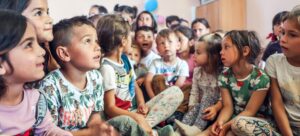Classroom teaching at these institutions is almost exclusively in Mandarin, with little or no use of the Uyghur language, they said in a statement.
They warned that separating the children from their families “could lead to their forced assimilation into the majority Mandarin language and the adoption of Han cultural practices.”
‘Orphans’ with families
The experts said they have received information about large-scale removal of youngsters from their families, including very young children whose parents are in exile or “interned”/detained.
The children are treated as “orphans” by State authorities and placed in full-time boarding schools, pre-schools, or orphanages where Mandarin is almost exclusively used.
“Uyghur and other minority children in highly regulated and controlled boarding institutions may have little interaction with their parents, extended family or communities for much of their youth,” the experts said.
“This will inevitably lead to a loss of connection with their families and communities and undermine their ties to their cultural, religious and linguistic identities,” they added.
Local schools closed
They said the children reportedly have little or no access to education in their own Uyghur language and are under increasing pressure to speak and learn only Mandarin, compared to education aimed at bilingualism.
Teachers can also be sanctioned for using the Uyghur language outside specific language classes.
The UN experts said they were also informed of an exponential increase in the number of boarding schools for other Muslim and minority children in Xinjiang in recent years.
Conversely, many local schools providing education in Uyghur and other minority languages have been closed.
“The massive scale of the allegations raises extremely serious concerns of violations of basic human rights,” they said.
About UN experts
The statement was issued by Fernand de Varennes, Special Rapporteur on minority issues; Alexandra Xanthaki, Special Rapporteur in the field of cultural rights, and Farida Shaheed, Special Rapporteur on the right to education.
The experts receive their mandates from the UN Human Rights Council in Geneva and are independent from any government or organization.
They are not UN staff and are not paid for their work.













